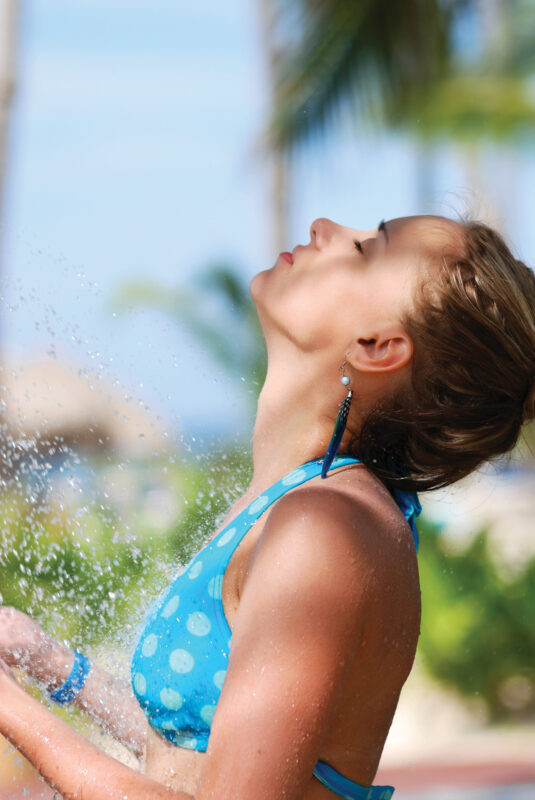Beat the heat this summer and stay well with the right diet and moderate exercise. Dr Parul R. Sheth provides you with top tips to help you stay healthy, energetic and active this season
Summer times can be fun—strolling in your shorts along the beach, immersing yourself in the swimming pool and shopping around in the malls. But the heat can kill. The stagnant hot air traps the pollution, the asphalt and the concrete on the roads, which in turn trap the heat during the day. Normally, your body keeps itself cool by allowing the heat to escape through sweat. But at times, your body can get overheated. The soaring temperatures and humidity can take a toll on your health. So now’s the time to get ready for summer ailments!
Heat stroke
Risk: You are out in the sun for long, doing heavy work in hot environment without taking in enough fluids. This can put you at a risk of a heat stroke or sun stroke. It is a form of hyperthermia in which the body temperature goes up. The heat and sun make you sweat profusely causing dehydration. Kids, obese people and the elderly are more at risk of dehydration. It is a medical emergency and can be fatal if not treated properly.
Signs: Red dry and hot skin, rapid weak pulse, rapid shallow breathing and faint feeling are signs of heat stroke. Dehydration can give you a headache, cramps and malaise.
What can you do: Cool yourself; have a cool shower. Stand or sit in front of a fan or an air conditioner. Paracetamol can help reduce headache and lower your body temperature. Drink plenty of fluids. Avoid going out in the sun especially between 12 noon to 3 pm. If you have vomiting and drowsiness, call your doctor.
Sunburn
Risk: Do you love basking in the sun? Summer is not the right time. Instead of that perfect suntan, you may end up burning your skin. Sunburn can be painful. The sun can cause allergies, especially if you have sensitive skin. Long-term exposure to the sun can cause premature ageing of the skin and lead to the development of freckles and flat brown spots.
Signs: Mild sunburn causes redness that disappears in a few days. Severe sunburn can cause blisters on the skin in addition to fever, chills and dizziness. Exposure to sunlight can give rise to skin allergies in those with sensitive skin causing red, itchy eruptions on the skin.
What can you do: If you notice sunburn on your skin, take a cool shower or use towel cold compress. Use a moisturising or a soothing cream such as calamine lotion. Add moisturising oil or emollient lotion to the bath to help replace the moisture you have lost which will also help to reduce any itching. Stay out of the sun until you are better. Before you venture out in the harsh sunlight, apply a sunscreen on the exposed skin with a sun protection factor (SPF) higher than 15. The higher the SPF the longer is the protection. It is best to avoid the afternoon sun. Perfumes and cosmetics may cause skin reactions in some of you while you are out in the sun.
Prickly heat
Risk: You tend to sweat a lot in the hot and humid weather. Bacteria, together with dead skin cells, block the sweat glands thus inflaming the skin. You are more at risk of prickly heat if you have skin that is sensitive to the sun. Babies, children and overweight individuals are more prone to prickly heat.
Signs: Spotty, itchy red skin rash that causes a pricking and burning sensation appears at the back of the knees, under the arms, waist, inner thighs and back.
What can you do: Apply calamine lotion or an oatmeal-based cream to soothe the itching. Antihistamines can help. In case of severe rash that lasts for a longer time, a mild steroid cream may be applied as per your doctor’s advice. Apply sunscreen before you go out in the sun. Wear loose-fitting cotton clothes and avoid heavy make-up. Maintain good personal hygiene, shower often and keep cool.
Dehydration
Risk: The hot summer heat drains fluids and electrolytes from your body. People who are aged, have high blood pressure and those who exercise in a hot environment are more prone to heat exhaustion
and dehydration.
Signs: Headache, nausea, muscle cramps, a rapid pulse, rapid breathing and feeling faint are signs of dehydration.
What can you do: Carry water bottles or juices, lemonade, electrolyte solutions, sports drinks, etc. along with you while you are travelling. Drink at least eight glasses of water in a day. Severe dehydration may need hospitalisation and treatment with intravenous fluids.

Eye ailments
Risk: Sunshine and glare during summer can strain your eyes. Dust and heat can cause eye irritation. Long-term exposure due to ultra violet light from the sunlight can put you at a risk of an early cataract formation. Lack of sleep during a very hot spell can also make your eyelids puffy and uncomfortable.
Signs: Eye infections such as conjunctivitis can cause red eyes. Sty, an eye infection appears
on eyelids.
What can you do: Use medicated eye drops or eye ointments to treat conjunctivitis. Warm water compresses can help the sty to burst open and dry up. Never squeeze or puncture a sty. Stop wearing eye make-up until the infection has cleared. Avoid wearing contact lenses, especially the soft or permeable types, while you have any kind of eye infection. Protect your eyes from the sun by wearing goggles that are 100 per cent UV rays resistant.
Stomach problems
Risk: Warm weather together with humidity is conducive for bacteria to multiply faster. Increased number of cookouts, parties and picnics in summer contribute to food poisoning and stomach infections. Eating stale food left out of the fridge, dirty work areas or food not cooked properly, etc. can cause food poisoning. Germs in the food multiply and eating or drinking contaminated food and water can give rise to gastrointestinal problems such as acidity, heartburn or diarrhoea.
Signs: Loose motions or watery stools, stomach ache, vomiting, gastritis or severe acidity and fever can afflict you because of consuming contaminated food and water. Heat and humidity can also cause acidity and indigestion causing stomach ache and a feeling of discomfort in the abdomen. You feel sick with bloating and a gurgling stomach. Heartburn gives you a burning feeling in the chest. Fasting, not having eaten for several hours and stress are risk factors for acidity.
What can you do: Generally, diarrhoea subsides on its own. However, water and salts are lost because of diarrhoea. It is therefore important to replace the lost fluids. Consuming readymade or homemade oral rehydration solution (ORS), drinking plenty of fluids, etc can help. Antacids can help reduce the acidity. Be very careful about what you eat during summer. Avoid drinking too much coffee, alcohol, hot and spicy foods or eating a big meal to prevent acidity symptoms. Proper storage of food during this season is important as food tends to become stale very quickly due to the high temperature.
Headaches
Risk: Women are more prone to summer headaches than men. Exhaustion, stress, not eating and drinking regularly when it is hot, acidity, dehydration, etc., can trigger headaches. Hot weather brings on migraines in some women.
Signs: Throbbing or sharp pain ranging from mild to severe can be felt all over the head, in the temple region, on the forehead, back of the neck or on one side of the head. Migraine causes severe pain and is often accompanied by vomiting, visual disturbance and trouble coping with noise or light.
What can you do: Most headaches induced by heat will usually clear up after a few hours, especially when it gets cooler. Pain-killers such as paracetamol or aspirin can help get rid of symptoms. An antacid can help ease the stomach acidity. Make sure you consume more than eight glasses of water each day in
order to prevent dehydration. Protect your head with a cap, a hat or an umbrella while you are out in the sun.

Colds and cough
Risk: You can catch a common cold even during summer.
Cold viruses can attack you and cause bronchitis, sinusitis or an ear infection.
Signs: Runny nose, an itching sensation in the back of your throat, watering of the eyes, cough, headache, sneezing or slight fever.
What can you do: Paracetamol can ease the symptoms. Decongestants help clear a blocked nose. Steam inhalation, eucalyptus, menthol, clove or camphor oil, are good for relieving a blocked nose. Salt water gargling can help clear a sore throat. Hot beverages, hot soups and broths make you feel better. Try sipping hot water with lemon and honey. A mixture of honey, ginger and black pepper powder can give some relief.
‘Pool’ trouble
Risk: School and college vacations are on during summer. You are out with your family to a resort, swimming in the pool to cool down and lazing out in the sun. Swimming in public pools can put you at a risk of skin infections.
You may get infected if you have a small cut or a wound on your skin. While bathing in rivers or ponds or unknown waters, you may swallow some water and thus end up with amoebiasis, a form of gastroenteritis.
Signs: Small blisters filled with yellow liquid can appear on your face and other parts of the skin. The culprits are streptococcus or staphylococcus bacteria. Stomach ache, vomiting, diarrhoea and dehydration occur due to amoebiasis.
What can you do: Practise proper hygiene. Wash your hands with soap and water, wipe hands dry to keep bacteria at bay. Avoid bathing or swimming in unknown waters. Avoid drinking water from an unknown source.
Respiratory allergies
Risk: With the mercury soaring, respiratory allergies flare up. Hay fever or allergic rhinitis occurs because of dust and pollution and pollen grains in the air. Common environmental exposures and foods also trigger allergies promoting respiratory attacks such as asthma.
Signs: Frequent sneezing, blocked runny nose, red and itchy eyes are signs of allergic rhinitis.
What you can do: Antihistamines anti-allergic medication help. These are available in the form of nasal sprays, tablets and syrups.
You can protect yourself from inhaling the dust and pollen by wearing a mask.


